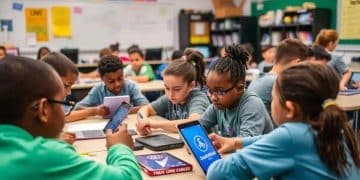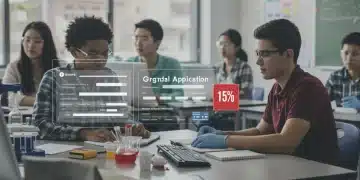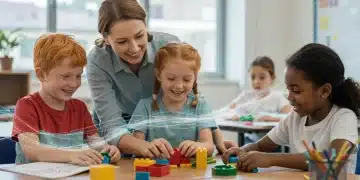Insights on high school coding classes that students love

Insights on high school coding classes reveal that they enhance critical skills, foster creativity, and prepare students for future careers in technology by providing hands-on learning experiences and encouraging innovative thinking.
Insights on high school coding classes show that these courses are more than just learning to program; they can ignite a passion for technology in students. Have you ever considered how coding influences their future?
The importance of coding in high school education
The importance of coding in high school education is often underestimated. In today’s digital world, knowing how to code opens up numerous opportunities for students. By incorporating coding into the curriculum, schools can prepare students to be competitive in the future job market.
Coding enhances critical thinking skills. When students learn to code, they develop the ability to break down complex problems into manageable parts. This skill is beneficial not only in programming but also in other areas of study and everyday life.
Why coding matters:
Learning coding can also foster creativity. Students are not just learning syntax; they are creating projects that reflect their ideas. This creativity is essential in various fields, from art to science.
- Coding teaches resilience, as students learn to debug and fix errors.
- It promotes collaboration when students work on group projects.
- Coding encourages innovation and the ability to adapt to new technologies.
Furthermore, coding is a universal language. It connects people across the globe, allowing collaboration beyond borders. Knowing how to code can empower students to participate in global conversations and projects.
Incorporating coding into high school education is not merely a trend; it is a necessity. Students who are equipped with coding skills will find themselves in a better position to thrive in various careers. By emphasizing coding in education, we are laying the foundation for a brighter and more innovative future.
Engaging teaching methods for coding classes

Engaging teaching methods for coding classes can significantly enhance student motivation and learning outcomes. Instead of traditional lectures, incorporating interactive activities can make coding fun and accessible for everyone.
One effective approach is the use of project-based learning. By allowing students to work on real-world projects, they can see the impact of their skills. Projects can range from simple games to more complex applications, depending on the students’ skill levels.
Interactive Learning Techniques:
Another engaging method is to incorporate gamification into the classroom. Students can earn points or badges as they complete coding challenges. This not only makes learning enjoyable but also encourages friendly competition among peers.
- Use coding games to reinforce concepts.
- Introduce team-based coding challenges.
- Encourage students to present their projects to the class.
Additionally, integrating collaborative tools can enhance the learning experience. Platforms that allow students to work together online can help them develop teamwork skills while coding. They can share ideas, troubleshoot, and learn from each other.
To keep the classes interesting, rotating between different activities—like pair programming, code reviews, and hackathons—can also be effective. This variety helps maintain excitement and keeps students engaged.
Moreover, inviting guest speakers from the tech industry can inspire students about potential career paths in coding. Hearing real-life experiences can motivate them to pursue their interests in technology and programming.
How coding classes prepare students for the future
Coding classes play a crucial role in preparing students for the future. As technology continues to evolve, having a strong foundation in coding opens up numerous opportunities. Students who learn coding can adapt to changing job markets and emerging technologies.
By participating in coding classes, students develop essential skills that are highly valued in many industries. One of the most significant skills is problem-solving. Coding often involves troubleshooting and finding solutions to complex issues. This ability is important not just in tech-related fields but in everyday life and various careers.
Skills Gained from Coding Classes:
In addition to problem-solving, coding enhances logical thinking. Students learn to break down tasks into smaller, manageable parts. This logical approach is critical in many aspects of work and education.
- Coding boosts creativity, allowing students to express their ideas through projects.
- It fosters collaboration skills when working in teams on coding assignments.
- Coding encourages persistence, as students tackle and resolve coding challenges.
Furthermore, understanding coding can give students a significant advantage in the job market. Many careers now require some level of coding knowledge. Fields such as engineering, data analysis, and even marketing increasingly depend on coding skills.
Learning to code also enhances digital literacy. In a world where technology is ever-present, being able to understand and create tech solutions is invaluable. This knowledge empowers students to participate actively in discussions about technology and innovation.
Ultimately, coding classes provide students with transferable skills that are relevant in almost any career path. As they master coding concepts, they also gain confidence in their abilities, preparing them to face future challenges and opportunities head-on.
Success stories from high school coding programs

Success stories from high school coding programs inspire both students and educators. These programs have transformed lives by providing students with essential skills and pathways to exciting careers. Through coding education, many students have found their passions and achieved impressive outcomes.
Many schools that incorporate coding into their curriculum see students flourish. For instance, students have created apps that solve community issues, showcasing their creativity and problem-solving abilities. These projects not only empower students but also positively impact their surroundings.
Real-life Examples:
One notable success story involves a group of students who developed a mobile app to assist local businesses. By using their coding skills, they gained real-world experience while contributing to their community. This project not only enhanced their coding abilities but also reinforced the importance of teamwork and collaboration.
- A student who developed a game that received accolades in a state competition.
- Another student launched a website that helps classmates find tutoring resources.
- A team that participated in a hackathon and won funding to develop their project further.
Moreover, success stories often highlight how coding classes boost students’ confidence. As they complete projects, students grow more comfortable with their abilities. This newfound confidence can lead to greater participation in class and a willingness to tackle challenging subjects.
In addition, many students who graduate from high school coding programs pursue further education in computer science or related fields. Their coding experiences provide a competitive edge in college applications, setting them up for successful careers in technology. Schools that celebrate these stories foster a culture of achievement that encourages future students to engage in coding.
FAQ – Frequently Asked Questions about High School Coding Classes
Why are coding classes important for high school students?
Coding classes are crucial as they equip students with essential skills for the future job market and enhance critical thinking, creativity, and problem-solving abilities.
What kind of projects do students work on in coding classes?
Students often work on a variety of projects, from creating apps and games to developing websites that solve real-world problems.
How do coding classes inspire students?
Coding classes inspire students by providing hands-on experiences that allow them to express their creativity and build confidence in their abilities.
What career opportunities are available for students who learn coding?
Students who learn coding can pursue diverse careers in technology, engineering, data analysis, and many other fields that require coding skills.





